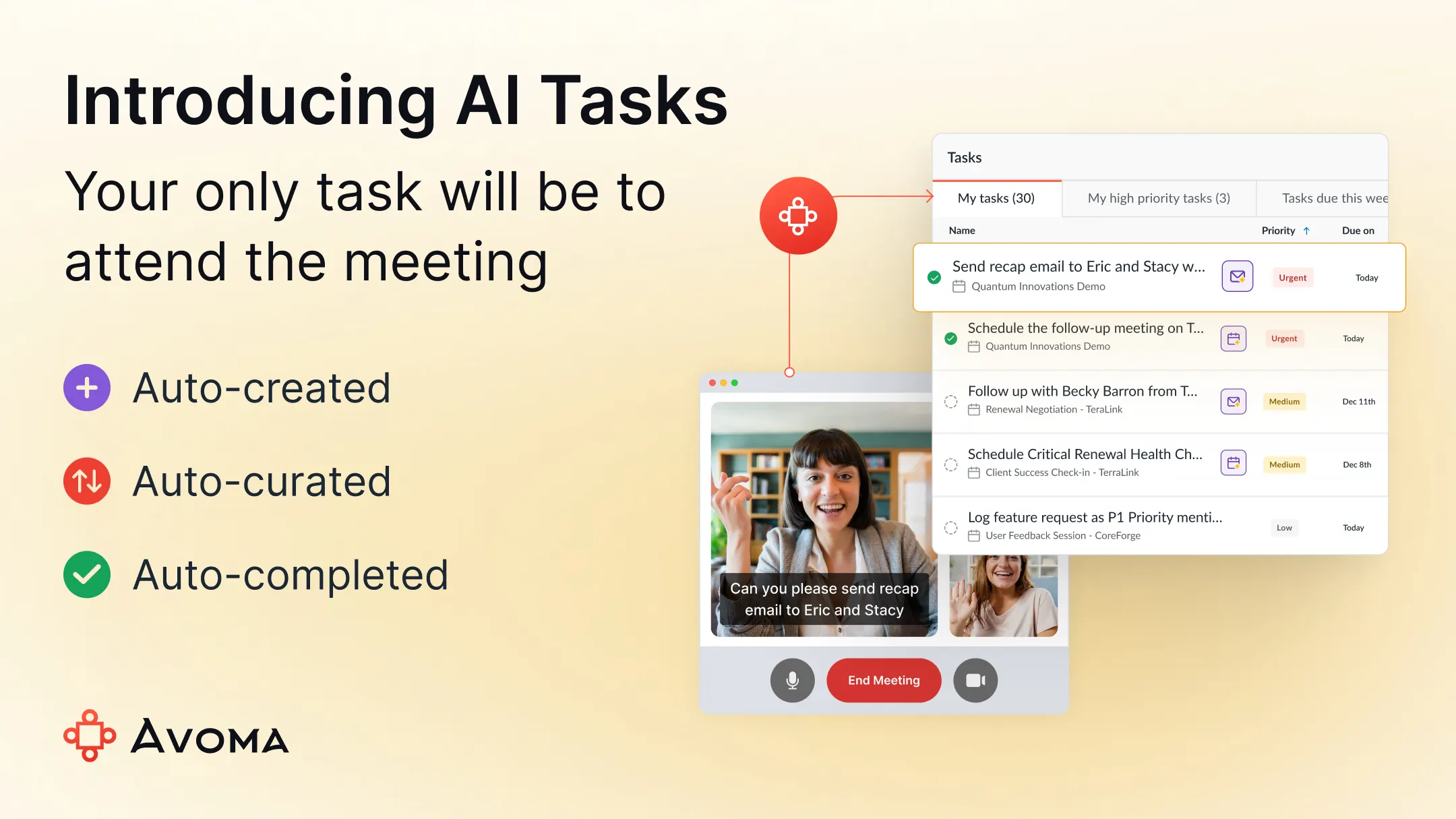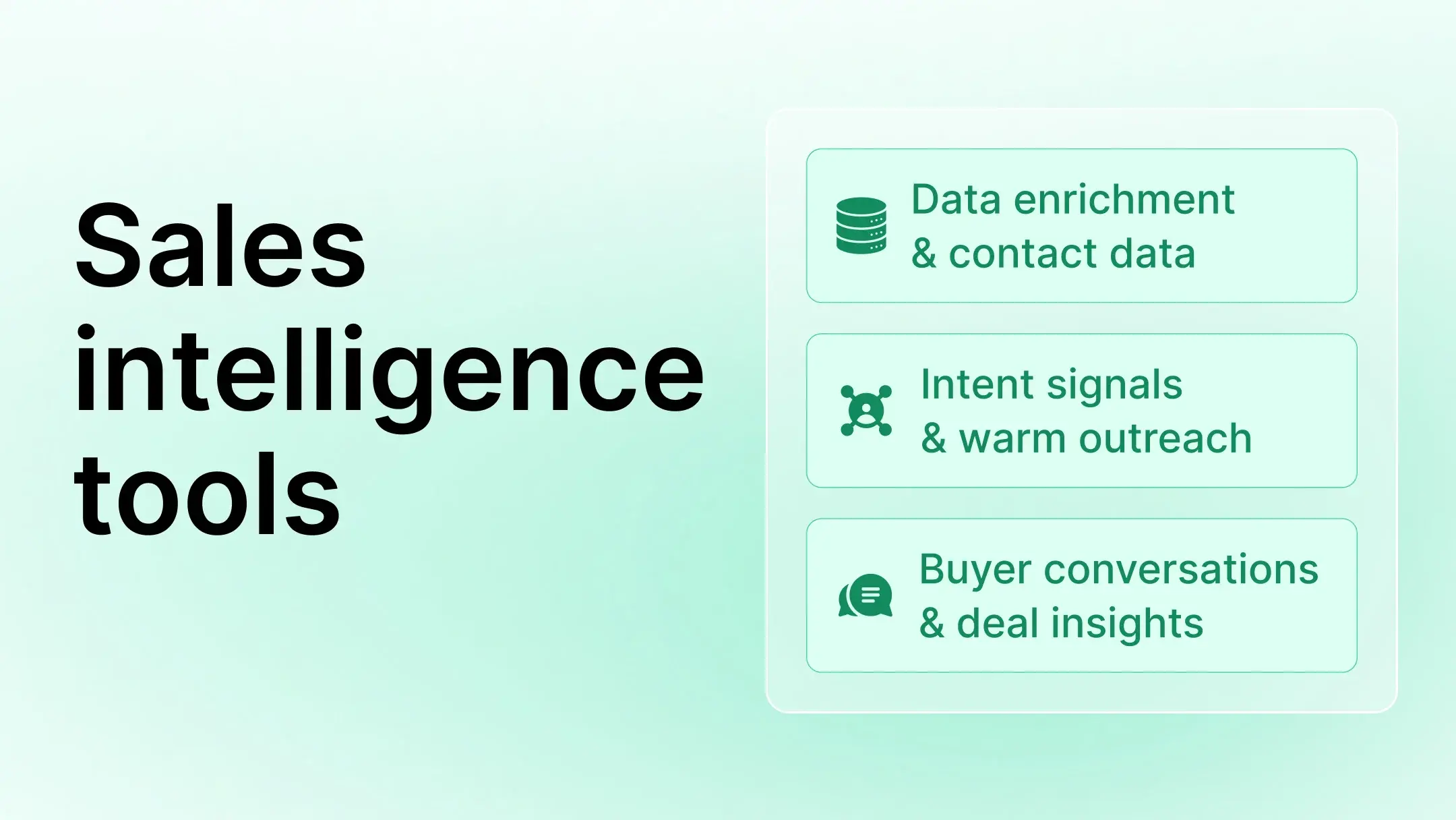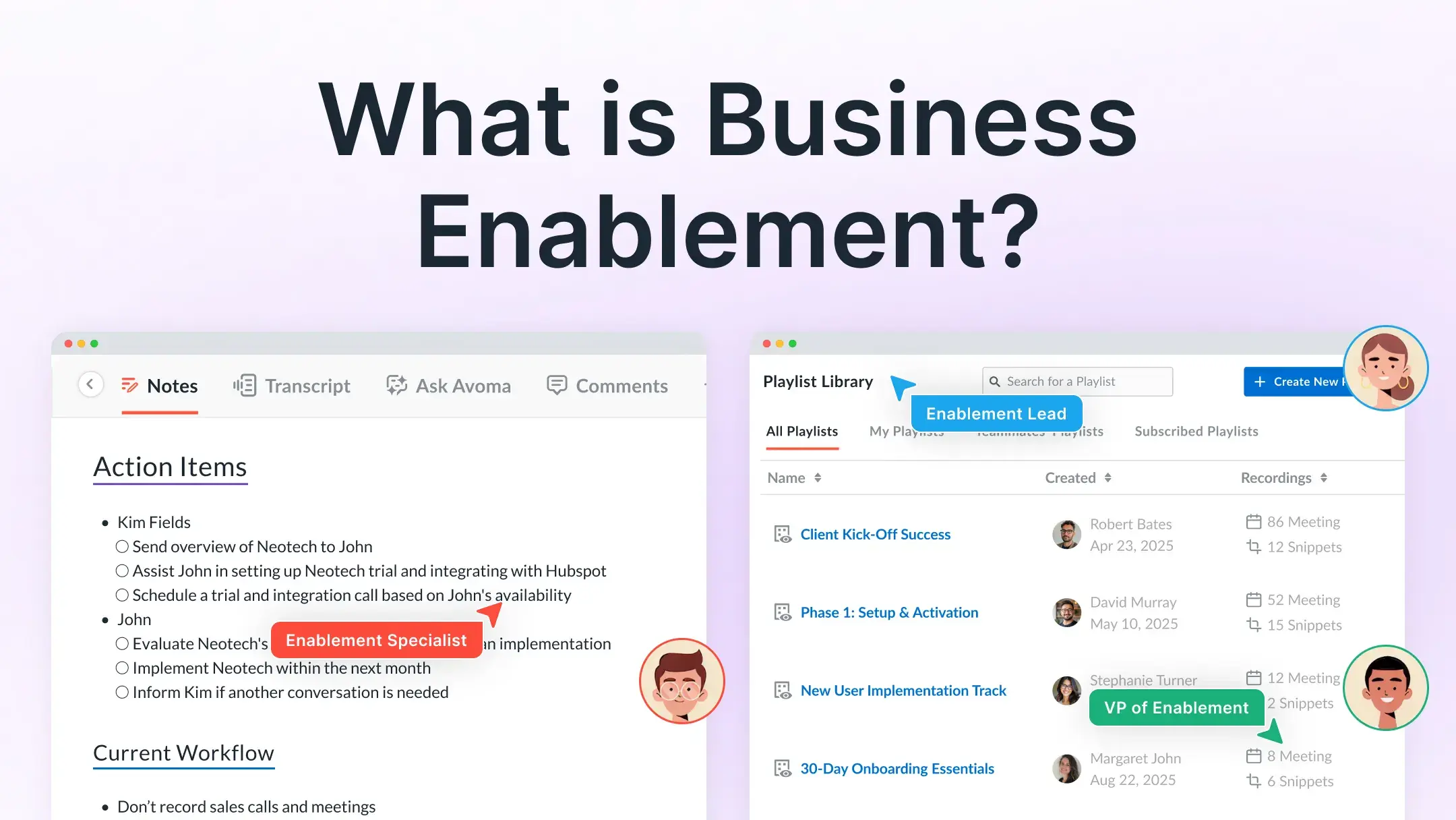Why do sales leaders review less than 1% of the calls?
Table of Contents:

It’s common for B2B companies to record their sales calls for tracking rep performance and training them for better sales outcomes. Sales call recording allows the sales managers to keep a tab on the most commonly asked questions, customer objections, or the best practices to close deals.
In recent years, call recording software has become an integral part of sales tech in most B2B SaaS companies. Brands spent thousands of dollars on call recording tools to analyze their sales calls and improve close rates.
More ambitious companies don’t just stop at call recording —they invest generously in conversation intelligence software to facilitate sales collaboration, improve rep productivity, create sales forecasts, and get actionable deal insights.
Conversation intelligence software is all the hype right now, but there’s one problem that’s stopping high-performance sales teams from making the most of these tools.
Most sales leaders don’t listen to sales calls
At Avoma, we talk to several sales teams day in and day out who come to us to evaluate Avoma’s conversation intelligence capabilities to improve their sales performance. As part of our discovery, we ask them several questions regarding their pain points, use cases, and objectives.
Our research tells us that 75% of sales leaders don’t even listen to sales calls—despite having the right tools in place.
In most companies, sales managers review less than 1% of all sales calls. This lack of adoption is directly proportional to a company’s coaching quality—and sales outcomes.
The more invested the sales leaders are in a company to listen to sales calls, the more likely they are to coach their teams—and the more likely the reps are to attain their sales quotas.
This raises a very important question: why do few sales leaders don’t listen to sales calls even though it's their job to coach?
After talking to a sizable number of sales leaders, we have found a few patterns in their behavior that offer interesting clues on why sales leaders don’t listen to sales calls as much as they should.
1. Sales managers don’t have enough time
Sales managers are some of the busiest people on the planet. They indeed have a ton of things to check through their to-dos every day.
Most sales managers we know think that listening to sales calls is an arduous and time-consuming process that is hard to scope into their packed calendars. They aren’t entirely wrong—listening to sales certainly is a laborious chore.
The majority of sales managers spend most of their time monitoring the sales dashboards, processing the CRM data, analyzing their team’s activity metrics, and hopping from one meeting to another.
These never-ending admin tasks prevent them from doing meaningful work—such as reviewing sales calls and coaching their reps—which can have a direct impact on the revenue.
2. Listening to calls is painstakingly tedious
Theoretically, the act of listening to sales calls sounds really easy. But for fast-moving sales leaders who have a ton of things to do on a day-to-day basis, sitting down to listen to 4–5 sales calls at 2X speed is as exciting as watching the paint dry.
The problem extends beyond just boredom.
Most sales managers that do listen to sales calls don’t have a proven technique to prioritize which calls to listen to—and in what order.
They decide to review sales calls on a whim and pick the calls based on random factors like an account’s revenue potential, how they are feeling that particular day, or a sales rep’s recent performance.
The idea of sitting idly to go through multiple demo or discovery calls and the decision fatigue to prioritize calls is what makes most sales leaders avoid listening to calls. And because this leads them to lack of visibility into how their reps are performing, they naturally become out of touch with the coaching needs of their teams.
Most conversation intelligence tools want to become the single source of truth and help businesses run effective sales forecasts. Conversation intelligence software is largely built to solve the problems of reps (e.g. to improve their productivity, forecasting, and collaboration) and not the managers.
They lack the inherent coaching capabilities that help sales managers get an overview of their reps’ performance and personalize their coaching feedback based on reps.
3. The disconnect between sales managers and reps on what good coaching looks like
There’s often a disconnect between what sales leaders perceive is important versus what the sales reps think. Let’s take coaching as an example.
In a survey run by Edinger Consulting a few years ago, sales managers ranked themselves pretty high (80% to be precise) when asked how well they thought they coached their teams.
When the interviewers asked the same question to the managers’ direct reports, they ranked their company’s coaching efforts at around 38%—less than half of what the leaders had self-reported.
This survey lends some answers to why sales leaders don’t listen to calls—because they think they are already doing a good job of managing their teams.
But the reality is different for the reps who crave more coaching and feedback.
What about the sales leaders that do listen to calls?
It would be unfair to say that all sales leaders don’t listen to their reps’ calls. Although in the minority, 25% of sales leaders do prioritize time on their calendars to listen to sales calls and offer coaching insights. But even they aren’t completely free from challenges that occur when it comes to reviewing sales calls.
Like we discussed earlier, most sales leaders have a limited time window to go through 4–5 sales calls—even if all they do is skim through them quickly at 2X speed. And they don’t necessarily have a methodical approach to choosing the calls to listen to.
Due to their busy schedule, they will choose calls that either appear on top of their conversation intelligence dashboard or the ones that carry a more promising ARR. This is an ineffective approach because it neglects the calls that actually need their attention or a rep who really needs coaching.
Once they start listening to a sales call, they don’t know what exactly to look for.
Generally speaking, they are looking for gaps in the rep's performance that they can fill with coaching. But they have to listen thoroughly and pause the call multiple times to add notes or comments. This act of juggling might lead them to overlook the areas that need feedback.
It’s a massive waste of time for sales managers to sit through a bunch of calls trying to force feedback insights without an intelligent system to rate the call.
As a result, a lot of sales managers end up leaving subjective feedback on calls that isn’t really helpful for the reps.
Most call recording software and conversation intelligence tools fall short of giving sales leaders an easy way to review calls and accelerate coaching. They both lack automation capabilities that can help managers extend their coaching coverage, offer faster coaching feedback, and scale the coaching program.
Enter AI Coaching Assistant
With the widespread adoption of Generative AI, sales teams now accomplish twice in half the time. The latest AI advancements allow sales teams to automate their email writing process, prospect research, and forecasting.
But most conversation intelligence software existing today are missing the most obvious opportunity to build an AI capability that can have an all-around impact on B2B sales—coaching.
As of now, Avoma is the first and only conversation intelligence software that offers an AI Coaching Assistant.
With AI as their sidekick, sales managers can leverage AI to automate their coaching without spending a ton of time on each sales call.
Here’s an overview of how Avoma’s AI Coaching Assistant works:
AI does the first-round review and auto scores all calls
Avoma’s AI Coaching Assistant solves the problem for sales leaders to identify the right sales calls to review. The AI takes the first pass at rating all the calls against pre-defined evaluation parameters so that sales managers don’t have to worry about which ones to review.
The AI assigns a score for every call for the sales managers to identify at a glance which calls need their attention. They don’t have to pick a call at random. Instead, they can prioritize calls based on which ones have the lowest scores.

AI rates the calls on objective parameters
When listening to calls or reviewing them, sales leaders are prone to biases. Personal biases are bound to influence their coaching judgment when they are compelled to listen to 4–5 calls almost every day.
AI helps sales leaders combat this problem by letting them set objectives for each type of sales call.
Let’s take a sales discovery call as an example. One of the key aspects of a discovery call is to set the right expectations on how the call will progress so that the sales rep and the prospect are on the same page.
Avoma also allows you to set up scorecards to define performance benchmarks or how well the agenda was briefed by the rep. Similarly, you can define performance benchmarks for every aspect of the call to quickly give feedback back to your team for specific calls.

The AI Coaching Assistant scores all the calls on the defined parameters so that when a sales manager looks at the scores, they know exactly what to coach their reps on. By default, Avoma's AI scores based on three AI scorecard templates - SDR Prospecting Call template, Sales Demo Call template and Customer Success Call template with more to come!
It helps sales managers avoid their potential biases and allows them to coach their team more objectively.
Get 100% coverage for all sales calls
The average sales manager can’t have 100% call coverage for their teams, due to the sheer volume of sales calls on a given day.
Let’s be real: Between hiring new recruits, running the sales strategy, and monitoring sales performance—sales managers hardly have any time left. And when they carve out their precious time to coach reps, they have too many calls to keep a tab on and too much information to process.
This is where Avoma AI Coaching Assistant makes the difference.

The AI Coaching Assistant listens to calls and meetings at scale and objectively scores them on the defined parameters, thus completely automating the manual task of listening to calls and scoring on performance.
It’s like sales leaders can now leverage AI to surface the needles in the haystack.
Because the AI takes the first stab at reviewing the calls and rating them, sales managers already have a good start at identifying what calls to prioritize for their review. Once they start reviewing certain sales calls, the AI offers a drill down of the gaps in the call for the sales manager to take note of.

On average, it saves sales managers 5 hours every week, which means they get back time to do what they do best—coach each rep on specific areas they need to improve upon.
Make your conversation intelligence better with AI-assisted coaching
Conversation intelligence can help you with a lot of things—including detecting at-risk deals and alerting you to take corrective measures. But to build highly productive sales teams that can close the gap between their performance and the sales results, you need data at a much earlier stage.
Coaching is the proactive driver that offers sales teams granular data on how they can improve to close deals faster and more effectively. The old way of coaching, however, has many pitfalls that slow down the sales managers from providing timely, specific feedback.
Avoma’s AI Coaching Assistant helps you overcome the roadblocks in traditional coaching and improve sales performance. The automation capability makes your coaching program faster, more scalable, and more effective.
Sign up with Avoma to see how the AI Coaching Assistant can improve your sales coaching and performance.
Frequently Asked Questions






What's stopping you from turning every conversation into actionable insights?










